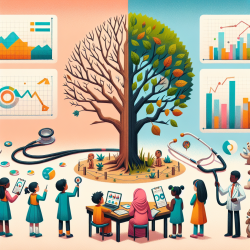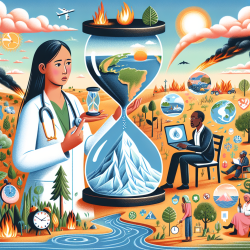Introduction
In the ever-evolving landscape of healthcare, particularly in the realm of speech-language pathology, the integration of data-driven decisions is not just beneficial but essential. As practitioners, our commitment to improving child outcomes can be significantly enhanced by leveraging research findings and implementing evidence-based practices. A recent study titled "Climate Change, Drought and Human Health in Canada" offers insights that can be pivotal in shaping our approach to therapy and intervention strategies.
Understanding the Impact of Climate Change on Health
The research underscores the increasing risk of drought in Canada due to climate change, with profound implications for human health. Droughts can lead to a myriad of health issues, including respiratory and mental health challenges, illnesses related to exposure to toxins, and food and water security concerns. These factors can indirectly affect children's learning and development, which is where our role as speech-language pathologists becomes critical.
Data-Driven Approaches in Speech-Language Pathology
To effectively address the challenges posed by climate change, practitioners must embrace data-driven approaches. By systematically analyzing data from various sources, we can tailor our interventions to meet the specific needs of children affected by environmental changes. This involves:
- Utilizing comprehensive health data to identify children at risk of developmental delays due to environmental stressors.
- Incorporating findings from climate and health research into therapy planning to address potential cognitive and emotional impacts.
- Collaborating with interdisciplinary teams to create holistic intervention strategies that consider environmental factors.
Encouraging Further Research and Collaboration
The study highlights significant gaps in our understanding of the short-term versus prolonged impacts of drought on health, particularly in children. As practitioners, we have the opportunity to contribute to this growing body of research. By participating in or initiating studies, we can provide valuable insights into how environmental changes impact speech and language development.
Collaboration with researchers and public health officials can lead to the development of innovative strategies that not only address current challenges but also anticipate future needs. This proactive approach ensures that we are prepared to support children in adapting to the changing environment.
Conclusion
As we continue to navigate the complexities of climate change and its impact on health, it is imperative that we remain committed to data-driven practices. By integrating research findings into our work, we can enhance our ability to support children in overcoming challenges and achieving their full potential. For those interested in delving deeper into the research, the original paper, "Climate Change, Drought and Human Health in Canada," provides a comprehensive overview and can be accessed here.










